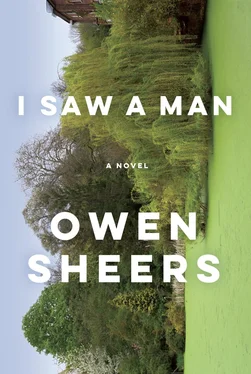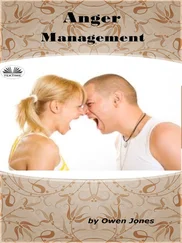To avoid such uninvited memories, he’d kept himself away from older friends, or from anyone who’d known him and Caroline as a couple. He’d declined his editor’s invitations to book launches, and had only agreed to meet with his agent at a restaurant away from his office. Cinemas, galleries, or theatres to which he and Caroline had once gone together were out of the question. In this way, London had been diminished by his grief, and so though familiar, made strange again, too.
As Josh poured himself another glass of red a child appeared at his leg, a girl tugging at his shirt. Her blonde hair had come loose of its bow. Smudges of chocolate were smeared across her T-shirt, its patterned hem hanging wide from her belly.
“Hey,” Josh said to her. “You come to say hello?” He bent to pick her up.
“This is Lucy,” he said, hitching her in the crook of his arm. “And this,” he continued, prising Lucy’s knuckle from her mouth, “is Michael, our new neighbour.”
Lucy buried her face in her father’s shoulder. Grasping at his collar, she rubbed its crease between her fingers.
“Oh, gone shy on us, have you?” Josh said to her, winking at Michael. “We’ll see how long that lasts, eh?”
―
Josh knew his daughter well. Less than half an hour later Lucy came to find Michael in the crowd, a doll in each of her hands. He was sitting on the arm of a sofa, on the edges of a conversation about the local hospital.
“This is Molly,” Lucy said by way of introduction, thrusting one of the dolls towards him. “And this”—she pushed out the other doll, its face marked with blue crayon—“is Dolly.”
“Well, hello,” Michael said. “Good to meet you. But what happened to Dolly’s face?”
“Well,” Lucy said, as if Michael had asked her opinion on the conversation behind him, “it started yesterday, you see. Molly was very cross with Dolly.”
With an ease that seemed foreign to the child he’d met earlier, Lucy began explaining the root of the dolls’ disagreement. As she talked she frowned down at them, both naked, one blonde, one brunette, absorbed in their story. Occasionally she raised her eyebrows, too, dramatically but with sincerity, as if trying out the expression for the first time.
Michael listened, grateful for the length of her explanation and happy to let her talk. He didn’t want to disengage from the party, but the truth was Lucy’s story, the solipsism of her age, had come as a relief to him. Earlier Josh, guiding him with his hand on his back again, had introduced him to a group of other guests. “This is Michael, our new neighbour,” he’d said, before moving on to greet others arriving in the hallway. Michael had shaken hands with them, and appeared to talk easily enough. But beneath the conversation his mind was double-tracking all the time, trying to keep one step ahead so as to steer it away from any question that might force him to mention Caroline or her death.
In the end he needn’t have worried. None of the other guests had seemed perturbed by his reticence, or anxious to question him in return. Ben, a colleague from Josh’s bank, owned a holiday cottage in Cornwall not far from where Michael had been brought up. Within minutes he’d been able to navigate them towards swapping recommendations on restaurants and galleries, coastal walks between shingle coves, hidden pubs. The one woman in the group, a young lawyer who’d introduced herself as “Janera, but call me Jan,” had been eager to tell him about a play she’d just seen. She’d gone on her own and it had made her cry. She couldn’t remember the playwright’s name, but she’d been at college with one of the actors. He’d had a full head of hair back then, but now he was completely bald and it was this, more than the play itself, about which she appeared most excited. The third guest was an older man in a blazer whose name Michael didn’t catch. He asked whether Michael’s flat had a view of the ponds on the Heath? When Michael said it did, the man, whose cheeks were rosy with capillaries, told him how he’d once swum in them on a Christmas Day in the sixties. He’d done it to impress a girl, whose name he’d forgotten now. There’d been a skin of ice at the water’s edge. She’d waited for him on one of the benches, wrapped in both their scarves, laughing.
As Michael listened and talked, nodded and smiled, he felt as if he’d stepped through a looking glass and was observing a world he’d left behind, a more simple, childish world, untutored by death. He knew it wasn’t true, of course. That every adult in the room would have lost. That each of them carried their own grief, however subdued, and that a fear of their own ends haunted them, too, whenever they allowed their thoughts to linger above that darkness. But none of that showed, and why should it? All of it was covered by the talk, the desire, the manners. And so Michael was left feeling adrift, the only seeing witness in a room of the chattering blind.
At their first interview for The Man Who Broke the Mirror, Oliver Blackwood had told Michael a man wasn’t born until he’d had children. At the time Michael said he couldn’t know, not having had any himself, but that he certainly agreed with the French when they said you became an adult only when you lost your parents. He’d spoken from experience. His own father had died while he was in New York. His mother, too, was seriously ill at the time. A year after that interview, she’d also died. Michael, an only child, missed them both terribly. In the months after his mother’s funeral the comment he’d made to Oliver had surfaced in his mind every day.
Michael had only just begun seeing Caroline when he’d answered the phone one morning to hear a carer at the nursing home tell him his mother had “passed on” during the night. Caroline was in the shower, and when she’d come downstairs she’d found Michael, the phone in his hand, staring at the table. They were still just discovering each other. The night he’d find her waiting for him in his bathroom was months away in their future. Their knowledge of each other was shallow. And yet Caroline had accompanied him every step along the deepening shelf of his mother’s death, nurturing him through the funeral and the quiet sadness afterwards. She was acquainted with it. That’s what she’d told him. So he shouldn’t see it as an imposition too soon, upon her or them. She knew death and what it did to the living, so he should let her help him, which he had.
But now, in the wake of hers, Michael couldn’t help think that both Caroline and Oliver had been wrong. If he’d been able to speak to her, if her ghost should have visited him one night, he’d have told her you cannot be familiar with death; it can only be familiar with you. And if he’d known at that first meeting with Oliver what he knew now, then he’d have told him that there was a birth into maturity beyond having children or losing your parents. It was the birth of an amputated love. Of having found a person in whom life makes sense, someone who expands you, only to have their death suddenly close you again, like the teeth of a woodland trap. And in that closing to experience a slow tearing in the fabric of your days, your years. This, he would have told Oliver, is the truest birth into adult knowledge. A rare wisdom shared with life prisoners and locked-in sufferers, to have your future taken from you, and yet still remain alive.
―
“And so Dolly said sorry and now they are friends.” Lucy punctuated the end of her story by jerking the two dolls in the air in front of her, shivering their synthetic hairstyles.
Michael smiled. “Well, I’m glad,” he said. “It’s more fun being friends than not being friends, isn’t it?”
Lucy cocked her head in mock thought. “Maybeee,” she said, drawing out the end of the word.
Читать дальше











